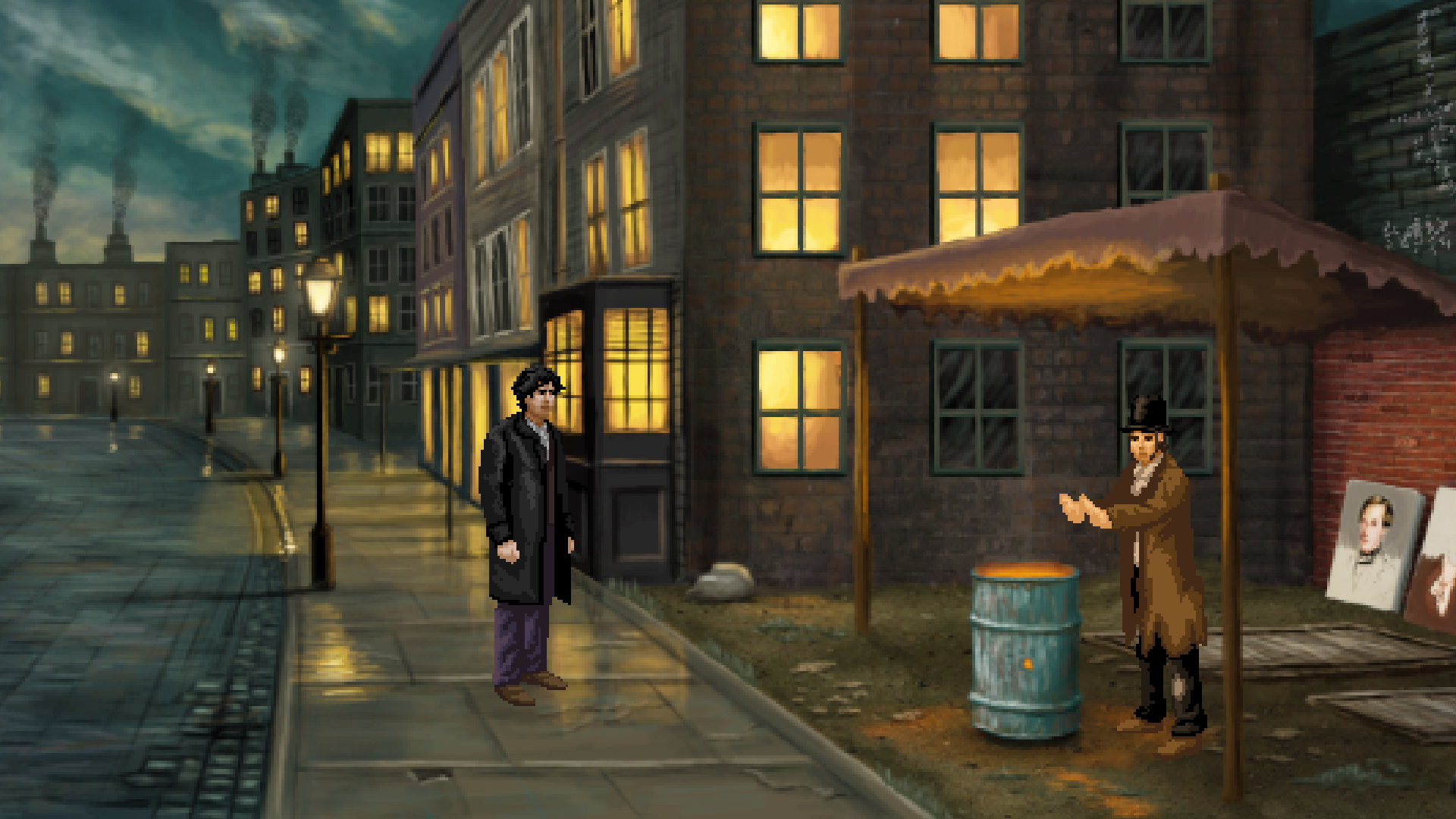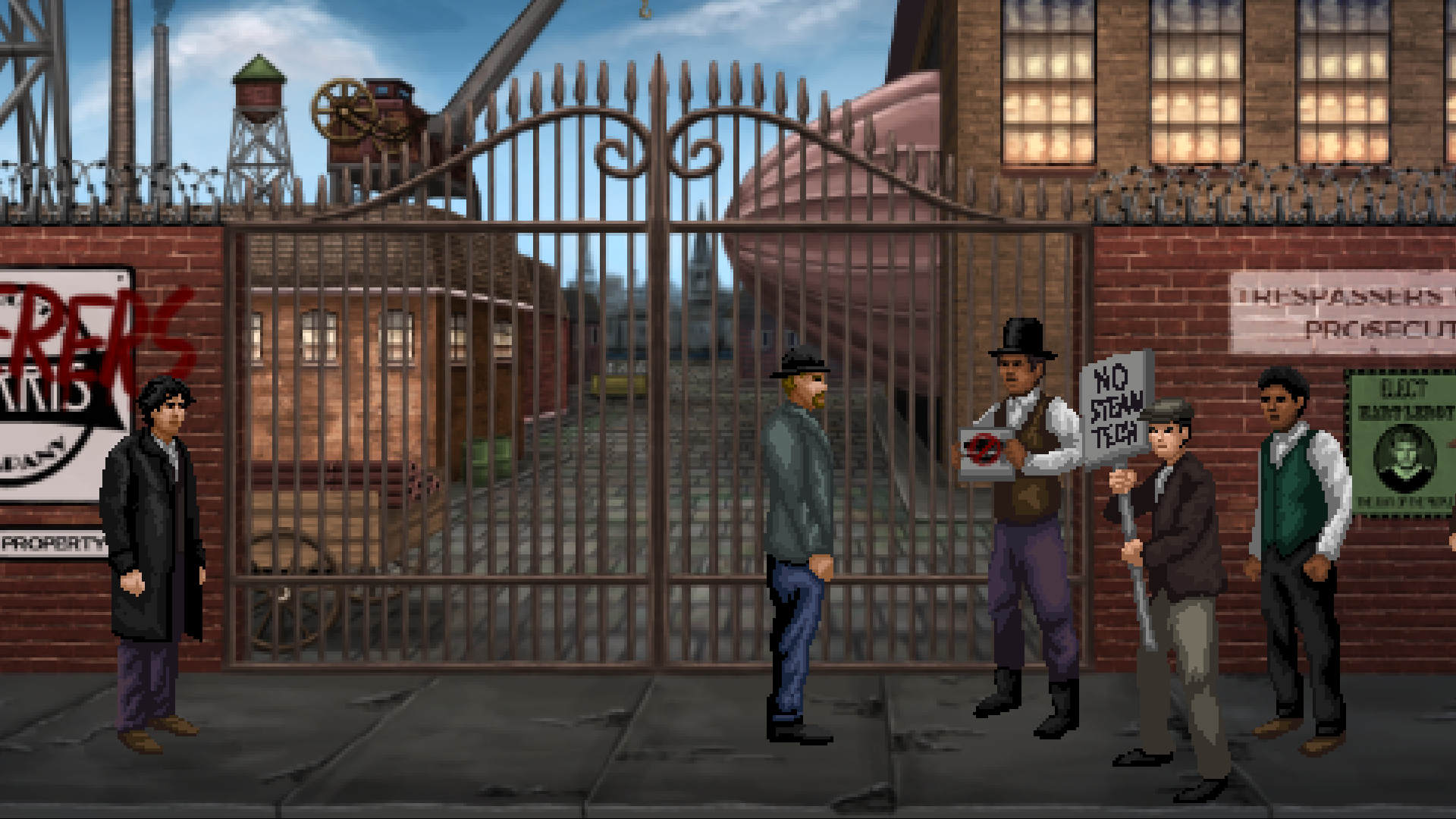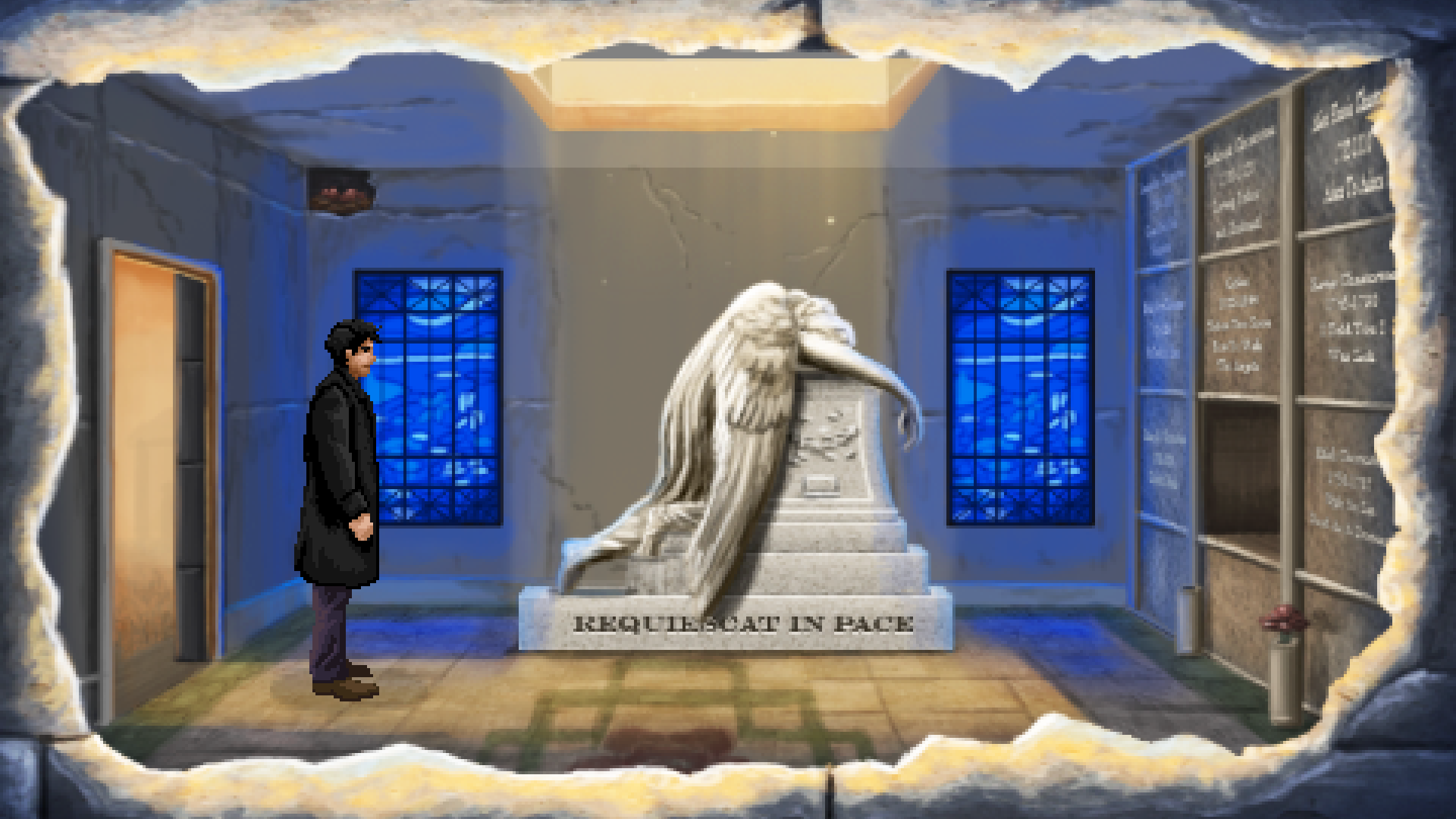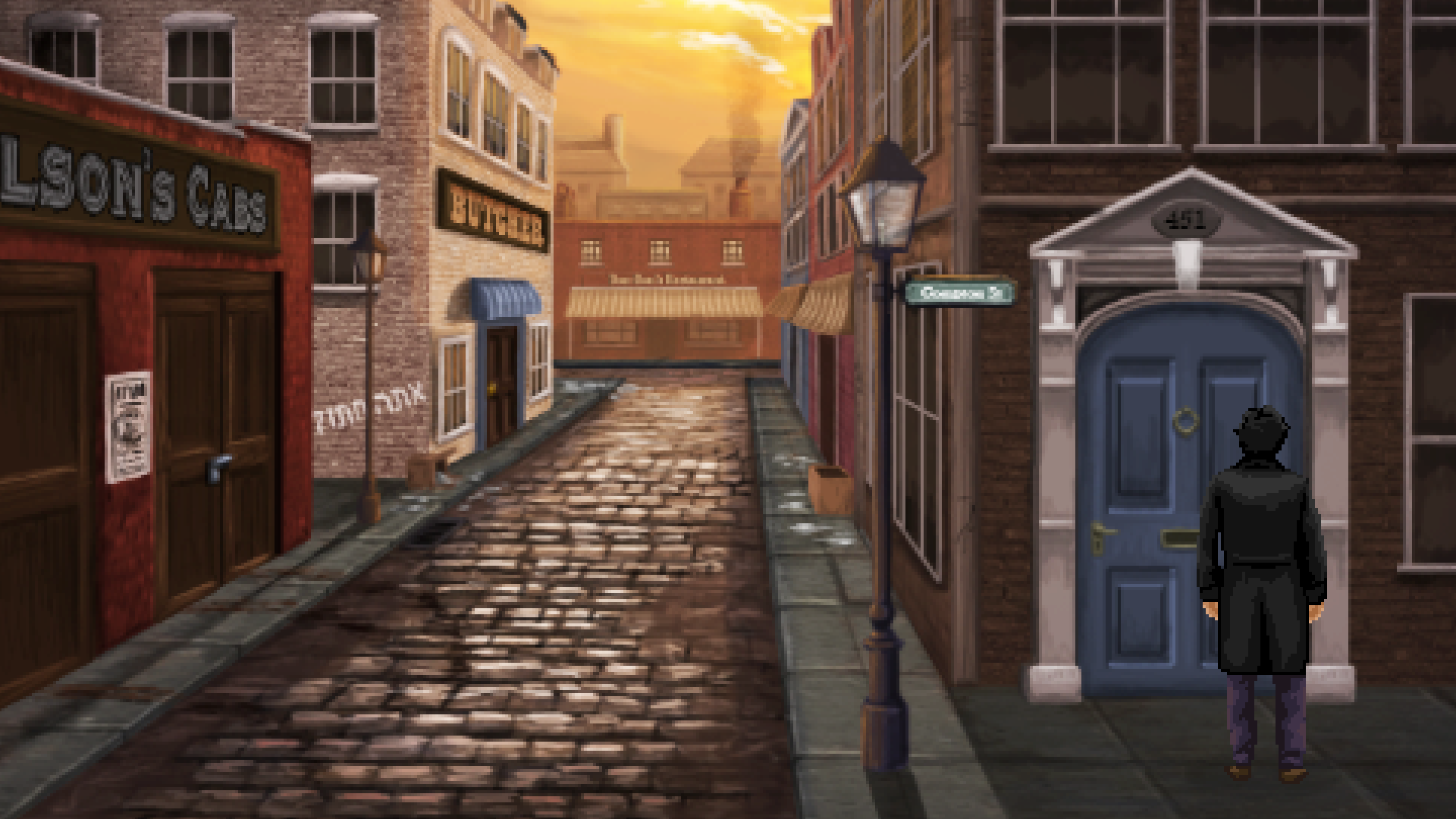Lamplight City is a detective adventure where it's okay to fail
Not every case has to be solved.
The next adventure from Grundislav Games is Lamplight City, a moody Dickensian detective story set in an alternate history where the US never declared independence. I talked to creator Francisco Gonzalez about the process of creating the fictional city of New Bretagne, troubled protagonist Miles Fordham, and how he wants to make a detective game where screwing a case up doesn't mean a game over screen and a reloaded save.
PC Gamer: Who do we play as, and what makes him tick?
Francisco Gonzalez: Miles is a former police detective turned private investigator whose life is coming apart. He feels responsible for the death of his partner, Bill, which made him resign from the police in disgrace. Not only that, he's begun hearing Bill's voice in his head at all hours. Is it Bill's ghost? Is it the guilt making him go crazy? All he knows for sure is that the only way to temporarily silence Bill is to take a sleep medicine. He's desperately trying to find the man who caused Bill's death, hoping it will bring him some closure and get rid of the voice, but he has no leads. All of this has put a strain on his marriage, as his wife senses he's keeping something from her. So all in all, Miles isn't having the best time.
Depending on how the game is played, could one player's version of Miles be different from another?
It's more that Miles's personal story will change, rather than his personality. Miles isn't a complete blank slate, but you can choose to be nice to people, or go the ‘bad cop’ route and be more of a jerk. Where Miles ends up and how his relationships stand will depend on the choices you make throughout the game.
What kind of city is New Bretagne?
It's a mix of all my favorite elements from cities in detective fiction. It's mainly a mix of 19th century New York and New Orleans, with a bit of Victorian London thrown in. I wanted to create my own fictional city and world for this game, since it gave me more creative freedom, rather than picking a specific place and trying to be 100% historically accurate. The city itself is coastal, located on a river in roughly the area of northern Virginia. It's divided into four boroughs, each with its own distinct flavor. There's an influence of French and English culture, and also a large population of immigrants from the West Indies. My hope is that New Bretagne will feel familiar, but also unique enough to seem like a real place.
Keep up to date with the most important stories and the best deals, as picked by the PC Gamer team.
How has real history informed the creation of the city?
I studied the histories of New York and New Orleans, figuring out who would likely have settled in a city like this. Since the game takes place in an alternate history where the US never declared independence, it was clear that England would still be ruling over the country, so re-imagining the whole of the US as a Commonwealth was also fun. I also have a bit of a steampunk element, although it's not the top hats with goggles and mechanical arms variety. Rather, I wanted to acknowledge that there is an industrial revolution going on, just with technology that's a few decades more advanced, the idea being that since there was no Revolutionary War, scientific research has come further. This also opened up some interesting narrative opportunities to explore in themes like class divides, race issues, etc.
What kind of crimes will we investigate as Miles?
Since he's a private investigator who gets his cases under the table from his only friend in the police department, Miles will be investigating crimes that either the police don't prioritize, or that aren't quite as open and shut as they would imagine. There is, of course, one murder case, but there's also attempted murder and kidnapping. My favorite case involves a woman who mysteriously burns to death in her bed. Miles needs to determine if foul play was involved, or if it was something a bit more out of the ordinary. That one case is as close to the supernatural as the game gets, which is why I had the most fun. Also, it features some of my favorite characters, and a bit where you can be just an absolute jerk in the most twisted way possible.
Is the game an anthology of sorts, or are the cases linked by a larger narrative?
The four main cases are fairly standalone, although they have some thematic links to what Miles is going through. There's also some overlap in the characters you meet, so how you treat a character in an early case might affect a later case if you happen to meet them again. The overarching narrative is Miles's search for Bill's killer, and that is what the final case involves. Before that, however, Miles takes cases because he hopes that by staying involved in solving crimes around New Bretagne, he might find some connection or lead to the killer. Not only that, he needs to keep himself busy so Bill's constant talking doesn't drive him to the insane asylum.
Detective games often suffer from a lack of player agency. What steps are you taking to avoid this?
My biggest issue with detective games is that they often go out of their way to push you towards the right solution. The problem this creates is that more often than not, you as the player feel as though the game is solving the mystery for you, or that the detective you're playing as is smarter than you. So I decided to try making a detective game where it's okay to get things wrong, or to completely fail and not be able to solve a case, but allow the story to continue.
Each case in Lamplight City has multiple suspects and leads to pursue. It's entirely possible to get everything right, accuse the wrong suspect, or screw everything up and reach a dead end. If you do reach a dead end, you simply report to your police contact, declare the case unsolvable, and move on to the next one. The way each case plays out will have an effect on the story, so don't expect to get the best ending if you declare too many cases unsolvable. By allowing you to fail, and letting you discover clues and pursue the leads you think are important, my hope is that you as the player will feel like a detective, rather than just playing as a detective character who isn't allowed to be wrong.
What are the unique challenges of designing a game that reacts to a player's choices?
There are quite a few! Mainly it's trying to tie everything together into a satisfying and cohesive narrative. It's easy to say you want to make a game where it's okay to fail, but you also have to create an enjoyable experience for players who want to go through and play the game getting everything wrong on purpose. If nothing really changes with a different play style, then it's easy to feel cheated, so I wanted to make sure that your choices felt like they mattered. Obviously, I'm a solo indie developer, so I didn't set out to make an impossibly huge epic AAA branching narrative, but I feel that the game has enough variety that it will require at least three playthroughs to see all the content.
You have a history in adventure games. Would you consider this a 'classic' point-and-click game, or are you playing with the genre in any interesting ways?
I've been referring to this as a 'detective game' rather than an 'adventure game', mainly because it focuses more on the actual investigations, clue-finding, and interrogations rather than any sort of inventory-based puzzles. In fact, the game doesn't have a traditional inventory system at all. I took inspiration from Westwood's 1997 Blade Runner adventure game, where you would pick up items at crime scenes, but there were no 'use item on hotspot' type puzzles.
In this game, if you find a tool or item that can help you overcome an obstacle, the cursor will either change automatically to indicate that a new action is available, or interacting with the object will bring up a menu from which you can choose to use said item or tool. My main goal was to avoid going into the realm of the implausible by having puzzles requiring you to collect and combine all sorts of items. That sort of thing is fine in comedies or more traditional point-and-clicks, but in my opinion it has no place in a more serious detective game.
How would you describe the atmosphere?
It's not overly serious, but it does have somewhat of a dark tone. Miles is dealing with some tough issues in his life, as well as investigating some disturbing and sometimes gruesome crimes, so it's not all sunshine and rainbows. That being said, I did want to balance it out with a fair amount of humour, although it's of the more witty and dry variety than zany comedy.
In terms of the visuals and audio, I want players to feel like they've stepped into a John Atkinson Grimshaw painting. His work is so moody and atmospheric, and I wanted to do my best to emulate that in the game's night scenes and general feel. The soundtrack is being composed by Mark Benis, who is doing an amazing job of making the score sound like a lost Hitchcock film. I really believe that this sort of filmic music is rare in adventure games, and really brings the whole thing to life in a unique way. I'm excited for everyone to hear it!
What fiction, in any medium, has influenced you when writing the game and building its world?
Before I came up with "Lamplight City" as the title (which was an extremely difficult process, but that's a whole other story) the game's code name was "Poe-Dickens." I wanted to take the macabre tone of Poe's stories and mix them with the memorable characters and odd names of Dickens's novels. Appropriately enough, Poe is credited as having invented the detective fiction genre, and Dickens's last novel (which he died before completing) was a murder mystery.
I was also deeply inspired by the Dishonored games with regards to world-building, since I admire them for their attention to detail and believability, something I tried my best to emulate. And I would be lying if I said that Gabriel Knight: Sins of the Fathers wasn't a huge influence on the game's aesthetic, particularly the close-up conversations.
If it’s set in space, Andy will probably write about it. He loves sci-fi, adventure games, taking screenshots, Twin Peaks, weird sims, Alien: Isolation, and anything with a good story.






